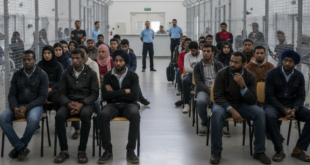Germany’s federal cabinet wants to add three Maghreb states and Georgia to a list of “safe countries of origin.” But will the change pass Germany’s upper house of parliament, the Bundesrat, where it failed last year? Timothy Jones and Jefferson Chase report.
The German government will put forward legislation declaring Tunisia, Morocco, Algeria and Georgia “safe countries of origin.” The decision was reached after the weekly meeting of Chancellor Angela Merkel’s cabinet on Wednesday in Berlin.
If enacted, the change in the law would make it easier for Germany to turn back people from and deport them back to the countries in question, which have been frequently accused of human-rights violations.
“This means that people from these safe countries cannot call upon a right to asylum (in Germany),” German Interior Minister Horst Seehofer told reporters, adding that the proposed legislation was “an important contribution” to Germany’s attempts to balance humanitarian concerns with a desire for “order.”
Seehofer said that asylum applicants from the countries concerned had a success rate of less than five percent. But he also said that individual appeals to the rules would be possible and that people from the four countries in question who were already studying or working legally in Germany would be exempt from deportations.
The government initiative comes amidst discussions surrounding the deportation of an alleged former bodyguard of al-Qaida leader Osama bin Laden to Tunisia. But German conservatives say that the proposed legislation is also needed to combat crime.
“The classification of these states is long overdue,” said the deputy chairman of the conservative CDU/CSU parliamentary group, Stephan Harbarth, in a statement. “Unfortunately it’s also true that migrants from these countries are disproportionately involved in criminal acts.”
The bill is part of Seehofer’s controversial “migration master plan.” But there is no guarantee that it will ever become law.
Parliamentary approval a hurdle
Germany’s 16 federal states, and not the federal government, are responsible for carrying out deportations. So the proposed legislation must be approved not only by the Bundestag, where the government has a majority, by the upper chamber of parliament, the Bundesrat, where it does not.
As Seehofer acknowledged, that leaves the government dependent on opposition parties like the Greens.
“No one has the majority — we need the votes of two states with Greens in the government,” Seehofer said, adding that it was “premature” to speculate about “the behaviour of individual states.”
Harbath said that the legislative change should not “once again” founder on the opposition of the Greens in the Bundesrat, as happened last year. But approval remains unlikely, as a majority of states still have the Greens in their governments.
On Wednesday, Green Co-Leader Robert Habeck told a consortium of German newspapers that “so-called safe countries of origin do not solve any problems.”
“If it’s about returning people from the Maghreb states, you need functioning return agreements. If it’s about fighting criminality in Germany, you need a well-equipped police force,” he said. “And it is still a fact that journalists, minorities and homosexuals are not safe from persecution and arrest in the Maghreb states,” Habeck added.
The business-friendly Free Democratic Party has said it supports the proposed legislation. But refugee advocacy groups are highly critical, with the NGO Pro Asyl characterizing the rule change as an example of “frantic political activism.”
© DW
 THE AFRICAN COURIER. Reporting Africa and its Diaspora! The African Courier is an international magazine published in Germany to report on Africa and the Diaspora African experience. The first issue of the bimonthly magazine appeared on the newsstands on 15 February 1998. The African Courier is a communication forum for European-African political, economic and cultural exchanges, and a voice for Africa in Europe.
THE AFRICAN COURIER. Reporting Africa and its Diaspora! The African Courier is an international magazine published in Germany to report on Africa and the Diaspora African experience. The first issue of the bimonthly magazine appeared on the newsstands on 15 February 1998. The African Courier is a communication forum for European-African political, economic and cultural exchanges, and a voice for Africa in Europe.

































